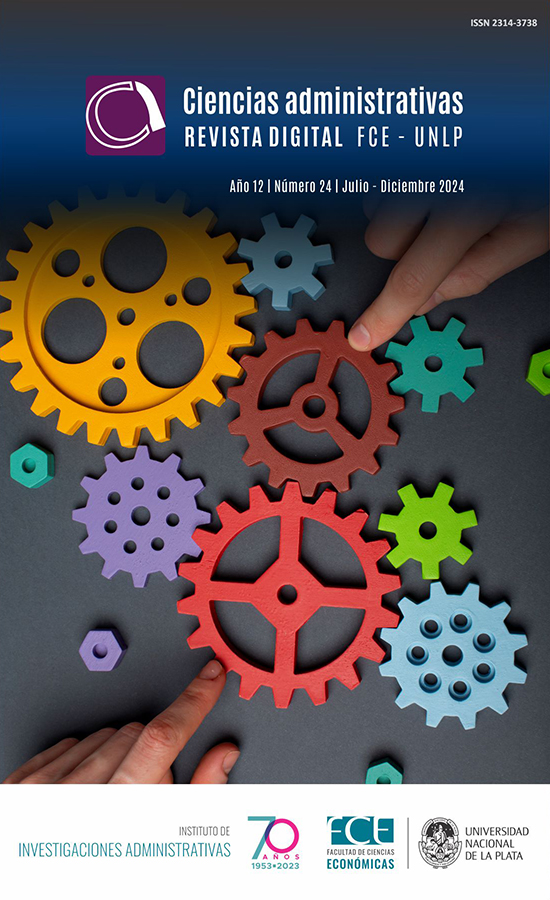Diagnose of family businesses future based on the study of family businesses founders, and the analysis of the evolution of family structures and business fabric in Spain
DOI:
https://doi.org/10.24215/23143738e138Keywords:
entrepreneurs, family business, family business founders, business trendencyAbstract
The objective of this study is to diagnose if a family business will be a growing or decreasing phenomenon within the business fabric. For that purpose, a sample of 50 Spanish family businesses from different sectors was taken which allowed us to identify different factors related to the the founders, such as age, number of children, or the support received by the family at the moment to start it up. With the information obtained, a clustering method was carried out to identify clusters. That characterization was taken as a basis to identify three factors that should be analysed: family structures, the business fabric landscape, and entrepreneurs' motivations. The evolution of these three factors, analysed using linear regression methods, seems to indicate a negative tendency of family businesses. Therefore the consequent diagnose of this study is to consider family businesses as a declining phenomenon.
Downloads
Metrics
References
Ahmad, N. H. y Seet, P.-S. (2009). Dissecting behaviours associated with business failure: a qualitative study of sme owners in Malaysia and Australia. Asian Social Science, 5(9), 98-104. DOI: https://doi.org/10.5539/ass.v5n9p98
Aldrich, H. E. y Cliff, J. E. (2003). The pervasive effects of family on entrepreneurship: toward a family embeddedness perspective. Journal of Business Venturing, 18, 573–596. DOI: https://doi.org/10.1016/S0883-9026(03)00011-9
Álvarez Cáceres, R. (1995). Estadística multivariante y no paramétrica con SPSS. Díaz de Santos.
Anderson, R. C., Duru, A. y Reeb, D. M. (2012). Investment policy in family controlled firms. Journal of Banking & Finance, 36(6), 1744-1758. DOI: https://doi.org/10.1016/j.jbankfin.2012.01.018
Bird, M. y Wennberg, K. (2016). Why family matters: the impact of family resources on immigrant entrepreneurs' exit from entrepreneurship. Journal of Business Venturing, 31, 687–704. DOI: https://doi.org/10.1016/j.jbusvent.2016.09.002
Bovis, C. (2020). The liberalisation of public procurement and its effects on the common market. Routledge Revivals. DOI: https://doi.org/10.4324/9780429442056
Carlsson, G. y Karlsson, K. (1970). Age, Cohorts and the Generation of Generations. American Sociological Review, 35(4), 710-718. DOI: https://doi.org/10.2307/2093946
Chrisman, J. J., Chua, J. y Sharma, P. (2005). Trends and directions in the development of a strategic management theory of the family firm. Entrepreneurship: Theory and Practice, 29(5), 555-576. DOI: https://doi.org/10.1111/j.1540-6520.2005.00098.x
Claßen, C. A. E. y Schulte, R. (2017). How do conflicts impact change in family businesses? The family system and familiness as a catalytic converter of change. Journal of Organizational Change Management, 30(7), 1198-1212. DOI: https://doi.org/10.1108/JOCM-04-2016-0071
Corona, J. y del Sol, I. (2018). Factores de competitividad y análisis financiero en la empresa familiar. Instituto de la Empresa Familiar.
Delmar, F. y Davidsson, P. (2000). Where do they come from? Prevalence and characteristics of nascent enterpreneurs. Entrepreneurship & Regional Development, 12(1), 1-23. DOI: https://doi.org/10.1080/089856200283063
Diéguez-Soto, J., López-Delgado, P. y Rojo-Ramírez, A. (2015). Identifying and classifying family businesses. Review of Managerial Science, 9, 603-634. DOI: https://doi.org/10.1007/s11846-014-0128-6
Dieleman, M. y Koning, J. (2020). Articulating values through identity work: advancing family business ethics. Journal of Business Ethics, 163, 675–687. DOI: https://doi.org/10.1007/s10551-019-04380-9
El Economista (s.f.). Ranking de Empresas. Recuperado el 10 de septiembre de 2022 de https://ranking-empresas.eleconomista.es/ranking_empresas_nacional.html
García-Álvarez, E. y López-Sintas, J. (2001). A taxonomy of founders based on values: the root of family business heterogeneity. Family Business Review, XIV(3), 209-230. DOI: https://doi.org/10.1111/j.1741-6248.2001.00209.x
García-Pozuelo, B. (2019). España, entre los diez países de la UE con más divorcios. ABC. https://www.abc.es/sociedad/abci-espana-entre-diez-paises-mas-divorcios-201907171729_noticia.html
Honjo, Y. (2000). Business failure of new firms: an empirical analysis using a multiplicative hazards model. International Journal of Industrial Organization, 18(4), 557-574. DOI: https://doi.org/10.1016/S0167-7187(98)00035-6
Litz, R. A., Pearson, A. W. y Litchfield, S. (2012). Charting the future of family business research: perspectives from the field. Family Business Review, 25(1), 16–32. DOI: https://doi.org/10.1177/0894486511418489
Malik, T. H. (2019). Founder’s apprehension in small family business succession in Thailand: interpretative view of the situational distance. SAGE Open, 9(4). https://doi.org/10.1177/2158244019885135 DOI: https://doi.org/10.1177/2158244019885135
Miller, D., Le Breton-Miller, I., Amore, M. D., Minichilli, A. y Corbetta, G. (2017). Institutional logics, family firm governance and performance. Journal of Business Venturing, 32, 674–693. DOI: https://doi.org/10.1016/j.jbusvent.2017.08.001
Molina, J. H. (2007). Economía siglo 21: capital de asociación de mercado. Editorial El Conejo.
Nason, R., Mazzelli, A. y Carney, M. (2019). The ties that unbind: socialization and business-owning family reference point shift. Academy of Management Review, 44(4). DOI: https://doi.org/10.5465/amr.2017.0289
Pérez-Carballo Veiga, J. F. (1998). Compitiendo por crear valor. ESIC Editorial.
Shepherd, W. G. (1970). Market power & economic welfare. An introduction. Random House.
Timmons, J. (1990). New venture creation. Enterpreneurship in the 1990s. Irwin.
Ucbasaran, D., Shepherd, D. A., Lockett, A. y Lyon, J. (2013). Life after business failure: the process and consequences of business failure for entrepreneurs. Journal of Management, 39(1), 163-202. DOI: https://doi.org/10.1177/0149206312457823
Ward, J. L. (1998). Growing the family business: special challenges and best practices. Family Business Review, 10(4), 323-337. DOI: https://doi.org/10.1111/j.1741-6248.1997.00323.x
Additional Files
Published
How to Cite
Issue
Section
License
Copyright (c) 2024 Fernando Doral-Fábregas

This work is licensed under a Creative Commons Attribution-NonCommercial-ShareAlike 4.0 International License.
Those authors who have publications with this journal, agree with the following terms:
a. Authors will retain its copyright and will ensure the rights of first publication of its work to the journal, which will be at the same time subject to the Creative Commons Atribución-NoComercial-CompartirIgual 4.0 Internacional (CC BY-NC-SA 4.0) allowing third parties to share the work as long as the author and the first publication on this journal is indicated.
b. Authors may elect other non-exclusive license agreements of the distribution of the published work (for example: locate it on an institutional telematics file or publish it on an monographic volume) as long as the first publication on this journal is indicated,
c. Authors are allowed and suggested to disseminate its work through the internet (for example: in institutional telematics files or in their website) before and during the submission process, which could produce interesting exchanges and increase the references of the published work. (see The effect of open Access)




































